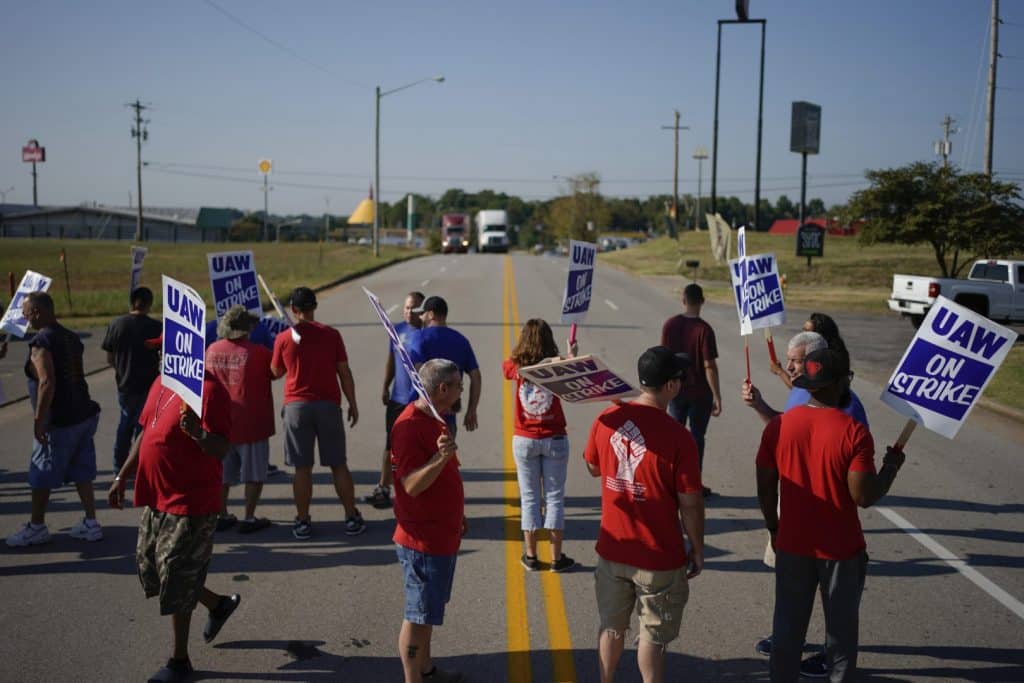This week marks the third in the historic strike by the United Auto Workers (UAW). The fight is heating up.
Last Friday, the UAW expanded its strike against the Big Three automobile manufacturers to “parts distribution centers.” PDCs are some of the most profitable parts of the companies’ business, shipping after-sales spare parts and accessories to car dealerships on a just-in-time basis.
Now the Big Three are ramping up their attack. They’re bringing in more scabs — strikebreaking workers — to fill in for those on strike in order to keep profits flowing.
Earlier in the strike, the bosses had already started making use of scabs, like to ship products from struck plants. The Teamsters, for their part, have said they refuse to cross any picket line to help the Big Three — a major example of solidarity from another union. So the bosses are hiring non-union truck drivers, who have been trying to enter PDC parking lots to pick up parts and deliver them. Twice, those truck drivers have pulled guns on the picketers who have refused to let them through.
On Tuesday, General Motors (GM) began bringing temps hired for $14 an hour to attempt to keep some of the parts and accessories flowing. It’s part of a broader plan by the bosses to staff the PDCs and move their product with scabs.
UAW members are finding creative ways to fight back. In part, they’ve started using “hard pickets,” that is, pickets that physically stop scabs from being able to enter PDCs. Workers are marching and refusing to move to let the scab trucks through; they’re blocking entrances with cars and they’re installing new locks on gates.
Unleashing the Power of the Rank and File
The UAW is calling for major concessions, like a 32-hour workweek, major raises to $40/hour, and an end to the hated two-tier workforce. What’s more, this strike is very popular. A majority of people in the U.S. are siding with the union against the bosses. There looks to be no quick end in sight, and there’s plenty of room for the union to expand the strike even further.
It’s become clear to everyone how much power the UAW is holding in its hands. For example, both of the presumptive nominees in the presidential election next year — Trump and Biden — are scrambling to visit Detroit and act like champions of auto-workers. Biden visited the pickets Tuesday; Trump is scheduled to visit a non-union plant Wednesday. For all their gestures, though, they’re still the parties of the capitalist class. Biden, like Trump, is afraid of the growing power of workers; the parties are competing for hegemony over them, to make sure they stay chained to the chariot of the rulers and follow their lead.
The Big Three is watching all of this. They have assessed the relation of forces; they’ve been knocked on their back foot. They understand, and fear, the power of the strike. They are trying to undermine that power by bringing in scabs tasked with keeping part and car production and delivery moving amid the strike. It’s part of a wider strategy to shift the balance of power in their favor, including laying off thousands of workers in response to the strike. In other words, this is the order of the day: bleed the strike, shift the relation of forces at the bargaining table in the bosses’ favor.
The UAW is powerfully pushing back against the scabs. But the Big Three will likely escalate their use of these strikebreakers in the coming days and weeks.
Stopping them is a major task, one that depends, above all, on the organizing of the rank and file themselves. That would mean, for example, continuing to build bigger and bolder pickets that bring in more workers and more sympathizers, to show with the power of numbers that scabs are facing the force of workers united with their surrounding communities.
It’ll take more, too, though, like expanding the “hard” pickets where workers are locking arms and gates to keep the non-union workers from entering. Doing that means going head-to-head with the labor law set up by Democrats and Republicans alike. These politicians might be acting like heroes of labor for now, but the labor law those parties have passed was set up to keep the balance of power in favor of the bosses, not the workers.
That law forbids workers from defending their livelihoods against the bosses by blocking scabs. Going head-to-head with labor law, then, means there’s a threat of police coming in to help break the strike. Police have always been the friend of the bosses and the enemy of workers. If history teaches anything, it’s that cops are an arm of organized government violence to assist the rulers, not protect the workers. That means it’s all the more important for a bottom-up, unified rank and file to defend themselves — with their own power and methods.
History teaches something else, too: the workers, united and militant, can and do win. In 1938, when auto-workers held their “sit-down strike” (then, as now, a fight against General Motors), the bosses called the cops on them. But the workers organized and defended themselves, and won. In Minneapolis in 1934, a roiling, rank-and-file-led strike by the Teamsters also used militant pickets — this time, “flying” pickets to shut down scab drivers all over the city. They won, too.
This time around, too, workers can defend their strike by unleashing even more of the creative power of the rank and file. This battle against scabs is one major key to winning big concessions in the strike. That’ll mean uniting different ranks of workers, across tiers, to fight together. To organize something so important on a big scale — to gather the solidarity and strength needed — calls for union energy to be poured into forms of organizing like local strike committees: places where workers of all ranks can link up with those in the surrounding communities, to organize themselves and decide for themselves how to best build up big, loud, militant, roiling, and powerful pickets.
The battle is heating up, and the working class is showing it’s ready to flex its muscles.











